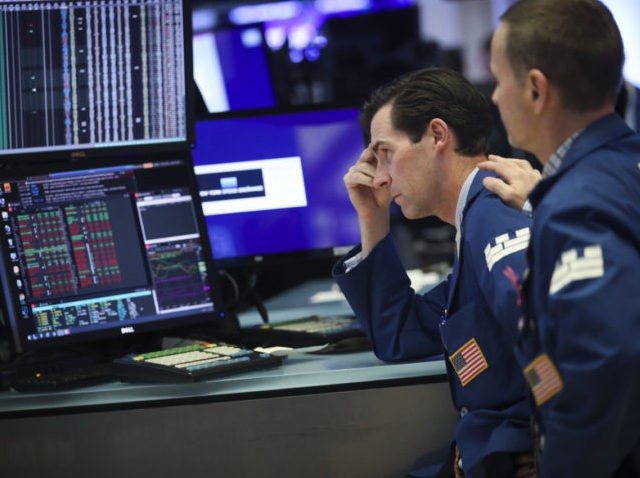Stocks fell Monday after a chaotic weekend in Hong Kong that concluded with the cancellation of all flights in and out of its airport and bond yields fell to new multi-year lows.
The Dow Jones Industrial Average dropped 392 points, or 1.5 percent. The S&P 500 fell 1.24 percent, and the Nasdaq Composite tumbled 1.2 percent.
Yields on bonds have been declining around the globe, with billions of dollars of European sovereign debt now having negative yields. The yield on the U.S. Treasury 10-year note fell to 1.654 percent on Monday.
Stocks opened lower to start the day and the sell-off accelerated in the final hours of trading. But the major averages recovered off their lows on the day in the last half hour.
Hong Kong police escalated the use of violence against protesters this weekend, the tenth since protests against Communist Party influence in the city began. Hong Kong International Airport canceled all flights Monday in response to a flood of thousands of protesters staging a sit-in. Investors in U.S. markets worried that further violence could derail trade negotiations with China.
Major Wall Street banks have been downgrading the economy and the chances for a resolution of the trade war. Goldman Sachs on Monday said in a note that the chances for a trade deal before the 2020 election had “collapsed.” Goldman lowered its estimate for fourth-quarter GDP growth to an annualized rate of 1.8 percent, down from its earlier forecast of 2.0 percent.
Still, few economists think a recession is likely in the next year. According to recent surveys, economists assign around a 35 percent chance of a recession in the next two years, up slightly from earlier in the year.
The Federal Reserve cut interest rates last month and is widely expected to cut again at the conclusion of its September meeting, particularly if trade tensions with China remain elevated. Fed policymakers believe trade uncertainty has slowed business investment in the U.S. and sluggish global growth is hurting U.S. manufacturing. Consumer spending, however, has remained robust and unemployment is very low.
Bank stocks were some of the worst performers on Wall Street Monday. Bank of America shares sank by around 2.5 percent. Citigroup shares were off by 2.9 percent. The financial sector of the S&P 500 was down 1.95 percent. Lower long-term interest rates put pressure on bank margins and unexpected jumps in bond yields can cause trading losses.
Chip stocks also sank lower. Share of Nvidia were down by 1.9 percent. Shares of Advanced Mico Designs plunged by more than 5 percent. The technology sector of the S&P 500 was down 1.3 percent.
All 11 sectors of the S&P were down for the day. The best performing sectors were utilities and real estate, each down by around one-third of a percentage point.

COMMENTS
Please let us know if you're having issues with commenting.